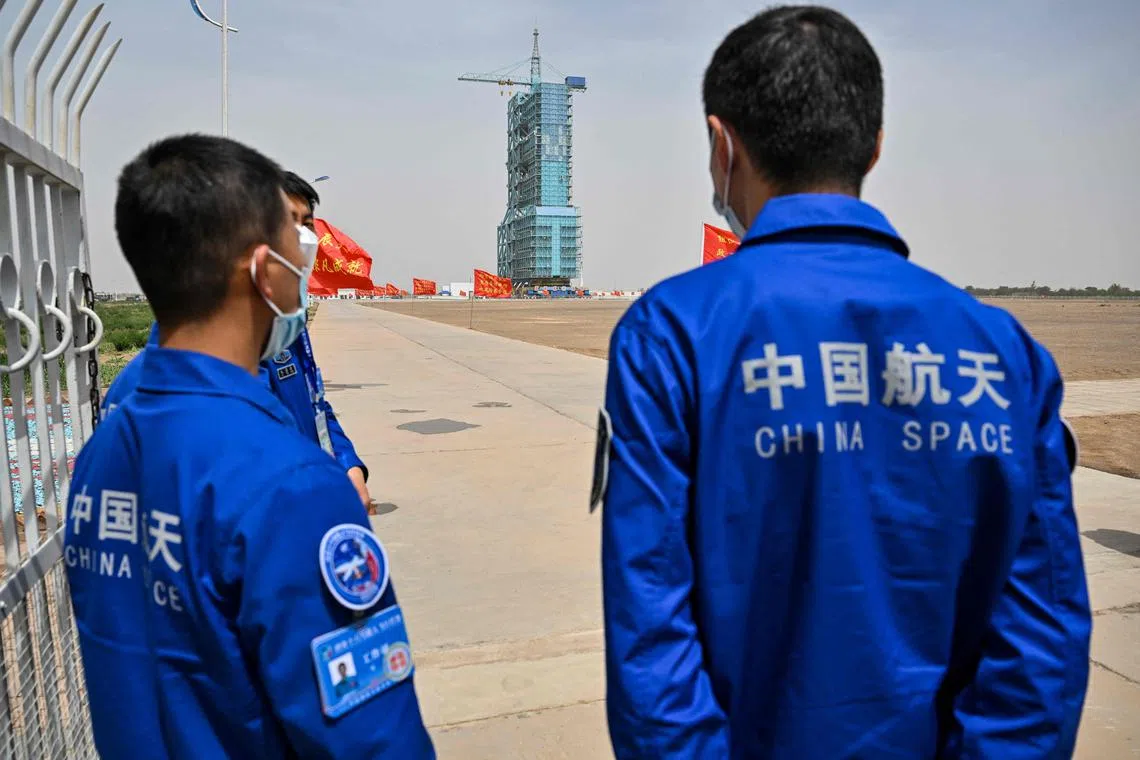China to launch Shenzhou-16 space mission with first civilian on board
Sign up now: Get insights on Asia's fast-moving developments
JIUQUAN, Gansu - China will be launching its first civilian and the country’s most experienced astronaut into space on Tuesday to mark the start of a new phase for Tiangong, its recently constructed space station.
Professor Gui Haichao of the Beihang University in Beijing will be travelling alongside veteran astronaut Jing Haipeng as well as Colonel Zhu Yangzhu, who will also be going into space for the first time. Major-General Jing will be leading the team.
They will be on board the Shenzhou-16, or Divine Vessel, which will be launched into space from Jiuquan Satellite Launch Centre in north-western China at 9.31am on Tuesday.
The carrier will be docked onto Tiangong, or Heavenly Palace, where the astronauts will take over from the crew of Shenzhou-15 and live in the space station for an estimated 180 days.
The Shenzhou-15 crew has lived in space for about six months. They took about a week to complete the handover from Shenzhou-14 in 2022. Construction of the three-module Tiangong was completed following the launch of its final module – Mengtian, or Dreaming Of The Heavens – in early November, after 1½ years.
With Shenzhou-16, Maj-Gen Jing will hold the record for having the most number of space missions in the country. He was previously on Shenzhou-7, 9 and 11. Shenzhou-5, which was China’s first manned mission, was launched on Oct 15, 2003.
Revealing the identities of the three men at a press conference at Jiuquan Satellite Launch Centre, China Manned Space Agency deputy director Lin Xiqiang said the assortment of skills of the latest batch of astronauts will be instrumental in the new phase of the Tiangong space station, which he referred to as “application and development” after construction.
In the latest phase, astronauts, which China also refers to as taikonauts, can better focus on carrying out experiments for cargo resupply, repair and maintenance of the space station, and work on breakthroughs in the fields of life ecology and materials science, he added.
Prof Gui’s duties will include the maintenance of the payload, which refers to parts of the spacecraft that will produce mission data and then sending the information back to headquarters. He will also be in charge of data collection and analysis.
The two military men – Col Zhu is a trained aerospace engineer and a former associate professor at the Space Engineering University – will control the spacecraft and carry out experiments.
Maj-Gen Jing said after the press conference that he has been doing at least 600 sit-ups, 600 push-ups and more than 1,000 skips of the jump rope every day to maintain his fitness. “That’s just the basics,” he said, adding that he has not gone back to his home town to see his parents in northern Shanxi province due to training.
Prof Gui said the dream of going into space, especially for academics, had seemed “sacred and far away” so when China allowed civilian experts to sign up to be astronauts in 2018, he did so without a second thought.
“I have long dreamed of moving my beloved research work into space,” said Prof Gui, who specialises in spacecraft systems.
The Shenzhou-16 will be relieved by the crew of Shenzhou-17, which is expected to be launched by November.

Chinese space programme staff standing before the launch platform of the Shenzhou-16 space flight mission on May 29, a day before the launch.
PHOTO: AFP



